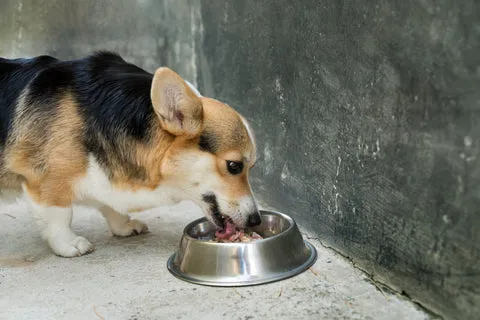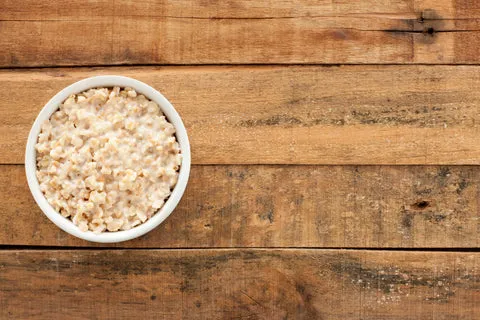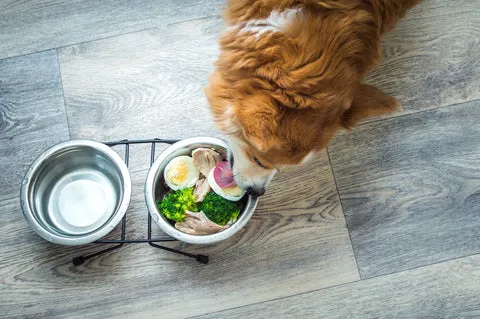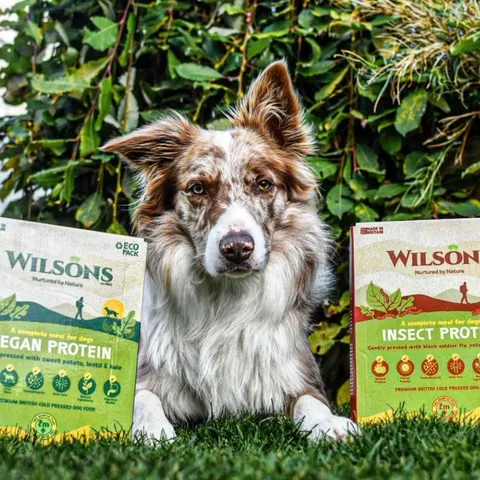When your beloved canine companion isn’t feeling their best, it’s completely natural to worry, especially when they lose their appetite or show signs of an upset stomach. Just like humans, dogs often go off their regular food when they’re feeling under the weather, making it challenging to know what to offer them. Providing your sick dog with the right nutritious and easily digestible food is crucial. It not only helps boost their energy levels during recovery but can also soothe their digestive system, speeding up their return to good health. Navigating dietary choices for an unwell pup can be confusing, but understanding What Can I Feed A Sick Dog is key to providing comfort and aiding their healing process.
This comprehensive guide will explore the best foods to offer your sick dog, focusing on options that are gentle on their stomach and provide essential nutrients without causing further irritation. We’ll also delve into practical feeding strategies and discuss suitable dietary choices for dogs with chronic sensitivities or allergies, helping you be prepared for unexpected health concerns. Remember, if your dog’s condition doesn’t improve or worsens, always consult your veterinarian for professional advice. Sometimes, a persistent illness requires expert diagnosis and treatment beyond dietary adjustments. For detailed guidance on specific dietary needs, exploring resources like what can you feed a sick dog can offer further insights.
Understanding Your Sick Dog’s Nutritional Needs
When a dog is sick, especially with gastrointestinal issues, their body’s needs change. They often require foods that are easy to digest, bland, and can provide hydration and essential nutrients without overwhelming their compromised system. The goal is to support their recovery, not complicate it.
Why Dogs Get Upset Stomachs
An upset stomach in dogs can stem from various causes, including dietary indiscretion (eating something they shouldn’t), infections (bacterial, viral, parasitic), stress, changes in diet, or underlying medical conditions. Symptoms commonly include vomiting, diarrhea, lethargy, and a decreased appetite.
Goals of Feeding a Sick Dog
The primary goals when feeding a sick dog are:
- Hydration: Many illnesses, especially those involving vomiting or diarrhea, can lead to dehydration. Foods with high moisture content can help.
- Blandness: Avoid rich, fatty, or highly seasoned foods that can irritate a sensitive stomach.
- Easy Digestibility: Choose ingredients that put minimal strain on the digestive system.
- Nutrient Support: Provide necessary calories, protein, vitamins, and minerals to support healing and maintain energy levels.
When to Consult a Veterinarian
While dietary changes can help manage mild symptoms, it’s vital to know when professional veterinary care is needed. You should contact your vet immediately if your dog exhibits any of the following:
- Severe or prolonged vomiting (more than 24 hours, or several times in a few hours)
- Bloody vomit or diarrhea
- Extreme lethargy or weakness
- Signs of pain or discomfort
- Lack of improvement after 24-48 hours of bland diet
- Difficulty breathing or other concerning symptoms
A vet can diagnose the underlying cause of illness and recommend the most appropriate treatment plan, which may include medication, IV fluids, or specialized prescription diets. This proactive approach ensures your dog gets the care they need to recover.
Top 10 Gentle Foods for a Sick Dog
When wondering what can I feed my dog when he’s sick, a plain, bland diet is usually the safest and most effective approach. Having some easily digestible options on hand can make all the difference in helping your furry friend recover. Here are ten highly recommended, nutritious, and gentle foods for dogs with an upset stomach:
1. Boiled White Meat (Chicken or Turkey)
Plain, boiled white meat like chicken or turkey breast is a top choice for a sick dog. It’s incredibly easy to digest, low in fat, and provides a good source of lean protein, which is essential for healing. The blandness helps to soothe your dog’s stomach without irritating it further.
Preparation Steps:
- Rinse the meat thoroughly under cold water.
- Remove any excess fat, skin, or bones completely.
- Place the meat in a pot and cover it with water. Bring to a boil, then reduce the heat and simmer for 15-20 minutes until thoroughly cooked.
- Once cooked, drain the water and cut the meat into small, bite-sized pieces to make it easier for your dog to digest and prevent choking.
- Allow to cool completely before serving, either alone or mixed with white rice.
 A small Chihuahua looking unwell, lying down after eating a bland meal for a sick dog.
A small Chihuahua looking unwell, lying down after eating a bland meal for a sick dog.
2. Plain White Rice
White rice is a staple in many bland diets for sick dogs because it’s easily digestible and low in fiber, which helps bind loose stools. While brown rice is more nutritious generally, its higher fiber content can be too much for an upset digestive system. White rice is the safer choice when your dog is ill. It’s an excellent companion to boiled white meat.
Preparation Steps:
- Rinse the rice under cold water until the water runs clear.
- Add the rice to a large pan with two parts water to one part rice.
- Bring to a boil, then reduce the heat to a simmer. Put a lid on the pan and allow the rice to cook on low heat for about 18 minutes, or until all the water is absorbed.
- Allow to rest and cool slightly; fluff with a fork, then serve. Avoid adding salt or butter.
 A Border Collie looking hopefully at a bowl of white rice, an ideal food for an upset dog stomach.
A Border Collie looking hopefully at a bowl of white rice, an ideal food for an upset dog stomach.
3. Cooked Sweet Potatoes
Plain, cooked sweet potatoes are a fantastic source of vitamins (A, C, B6), fiber, and minerals like calcium, iron, and magnesium. They are incredibly gentle on the stomach and intestines, making them an excellent choice for soothing digestive upset. The soluble fiber in sweet potatoes can help regulate bowel movements.
Preparation Steps:
- Never feed raw sweet potatoes, as they are harder to digest and can worsen stomach upset.
- Peel the skins from the sweet potatoes and chop them into chunks.
- Add to a pan of boiling water and boil until soft.
- Drain the water and mash the sweet potatoes thoroughly.
- Allow to cool completely before serving.
 Peeled and sliced sweet potatoes, ready for cooking as a gentle food for a sick dog.
Peeled and sliced sweet potatoes, ready for cooking as a gentle food for a sick dog.
4. Plain Pumpkin
Similar to sweet potatoes, pumpkin is highly effective for an upset stomach due to its high fiber content, which helps regulate digestion. It’s also rich in vitamins that support the immune system.
Preparation Steps:
- Offer up to four tablespoons of plain canned pumpkin (not pumpkin pie filling, which contains sugar and spices) or freshly cooked, pureed pumpkin.
- Ensure there are no added sugars, spices, or other ingredients that could further upset your dog’s stomach.
- Mix it with their regular bland meal or serve it alone.
 A happy Husky dog with a slice of pumpkin, a fiber-rich food for dogs with digestive issues.
A happy Husky dog with a slice of pumpkin, a fiber-rich food for dogs with digestive issues.
5. Homemade Bone Broth
Bone broth is a nourishing and hydrating option for sick dogs. It provides essential nutrients and minerals like sodium, potassium, and amino acids, which can aid in gut healing and hydration. It’s low in carbohydrates and very gentle on an upset stomach.
Preparation Steps:
- Add beef or pork marrow bones and chicken or turkey bones to a large cooking pot.
- Cover with a few inches of water.
- Cook on low heat for 20-24 hours. Avoid adding garlic or excessive salt, as these can be toxic or irritating to dogs.
- Once finished, strain to remove all bones and solids.
- Allow the liquid to cool completely before serving. You can also freeze portions for future use.
 A small puppy licking a bowl of homemade bone broth, a soothing drink for sick dogs.
A small puppy licking a bowl of homemade bone broth, a soothing drink for sick dogs.
6. Meat-Based Baby Food
For puppies or small dogs struggling with their stomach, stage 2 meat-based baby foods (e.g., chicken, lamb, turkey) can be a gentle and palatable option. Its smooth consistency makes it easy to swallow and digest.
Preparation Steps:
- Choose plain, meat-only baby food.
- Crucially, check the ingredients list to ensure there are no additives toxic to dogs, such as onion powder or garlic powder.
- Consult your vet if you are unsure about any ingredients.
 Three cute Doodle puppies eating from a shared plate of gentle food, like baby food, for sick puppies.
Three cute Doodle puppies eating from a shared plate of gentle food, like baby food, for sick puppies.
7. Poached Fish
Fish, especially white fish like cod or haddock, is an excellent source of healthy fats (omega-3s) and vitamins, which can support your dog’s immune system and overall health during recovery. The strong aroma of fish can also entice a dog with a lost appetite back to its bowl.
Preparation Steps:
- The best way to prepare fish for your dog is by poaching it.
- Add the fish to a pan of water, bring to a boil, then reduce heat and simmer for 10-15 minutes until fully cooked.
- Remove all bones meticulously and flake the fish into small pieces.
- Allow to cool before feeding.
 A Corgi happily eating a meal of poached fish from its bowl, suitable for a dog with a recovering appetite.
A Corgi happily eating a meal of poached fish from its bowl, suitable for a dog with a recovering appetite.
8. Plain Oatmeal
Plain, cooked oatmeal, made from rolled oats, can help soothe an upset stomach. Its high fiber content can aid both constipation and diarrhea by normalizing stool consistency. It also contains antioxidants that can help reduce stomach inflammation.
Preparation Steps:
- Cook plain rolled oats with water (not milk).
- Ensure no sugar, artificial sweeteners, or other additives are included.
- Serve in small quantities, as too much fiber can sometimes worsen an upset stomach.
 A bowl of plain, cooked oatmeal, a fiber-rich option to soothe a dog's upset stomach.
A bowl of plain, cooked oatmeal, a fiber-rich option to soothe a dog's upset stomach.
9. Unsweetened Plain Yogurt
Plain, unsweetened yogurt containing live and active cultures (probiotics) can be beneficial for a dog with an upset stomach. Probiotics support gut health and aid in digestion, potentially helping to regulate the digestive system if your dog is constipated or has mild diarrhea.
Preparation Steps:
- Choose plain, natural yogurt without any added sugars, artificial sweeteners (especially xylitol, which is toxic to dogs), or fruit.
- It’s readily available at most grocery stores.
- You can offer it directly or mix a small amount into other bland foods. It can even be frozen as a cool treat on a warm day.
 A cute puppy with a smear of plain yogurt on its chin, enjoying a probiotic treat for gut health.
A cute puppy with a smear of plain yogurt on its chin, enjoying a probiotic treat for gut health.
10. Cooked Eggs
If your dog is not actively vomiting, cooked eggs can be an excellent food choice. They are gentle on the stomach and provide a highly digestible source of protein, which can be an energy booster if your dog is lethargic after illness.
Preparation Steps:
- Scramble eggs without butter, oil, or seasonings, or boil them plain.
- Avoid feeding raw eggs due to the risk of salmonella and avidin, which can interfere with biotin absorption.
- If your dog is vomiting, it’s best to avoid eggs completely until the vomiting subsides.
 A dog eating scrambled eggs and mixed vegetables from its bowl, a good source of protein for a sick dog.
A dog eating scrambled eggs and mixed vegetables from its bowl, a good source of protein for a sick dog.
Feeding Strategies for a Sick Dog
Knowing what to feed a sick dog is just one part of the equation; how you feed them is equally important for their recovery. Here are some strategies to help ease your dog back to health:
Small, Frequent Meals
Instead of offering large portions, which can overload a sensitive digestive system, provide small amounts of bland food several times a day. For example, offer 3-4 small meals instead of one or two large ones. This reduces the burden on their stomach and allows for better digestion and absorption of nutrients. This method can also be helpful when you are trying to figure out what to do to get your dog to eat when they are hesitant.
Ensuring Hydration
Keeping your dog hydrated is paramount, especially if they’ve been vomiting or experiencing diarrhea. Always ensure fresh water is available. You can also offer low-sodium chicken broth (without garlic or onion) or bone broth to encourage fluid intake. Ice cubes can be a good option for dogs who are too nauseous to drink large amounts of water at once.
Monitoring Symptoms
Closely observe your dog’s response to the food you offer. Look for any signs of worsening symptoms, such as increased vomiting, diarrhea, lethargy, or loss of appetite. If you notice any adverse reactions, discontinue the food and contact your vet. Keeping a log of their intake and output can be helpful information for your vet.
Gradual Reintroduction of Regular Food
Once your dog has been eating bland food without issue for 24-48 hours and their symptoms have significantly improved, you can begin to gradually reintroduce their regular diet. Start by mixing a small amount of their regular food with the bland diet. Over the next few days, slowly increase the proportion of regular food while decreasing the bland food until they are back on their normal diet. This slow transition helps prevent a relapse of digestive upset.
For a broader understanding of suitable dietary options, including what can you feed your dog when they are sick, explore comprehensive guides that cover various conditions and food types.
What to Feed Dogs with Chronic Sensitivities or Allergies
If your dog frequently suffers from an upset stomach, persistent itching, skin issues, or other recurring symptoms, it might be a sign of food-related allergies or sensitivities. Consulting your veterinarian is crucial to properly diagnose any underlying allergies or conditions. Once diagnosed, managing their diet becomes a key part of their ongoing health. When considering what foods can i give my dog for allergy management, certain specialized diets can make a significant difference.
General dietary approaches for dogs with sensitivities often involve:
- Hypoallergenic Diets: Formulated with novel proteins (proteins your dog hasn’t encountered before) and limited ingredients to minimize allergen exposure.
- Limited Ingredient Diets (LID): Contain a minimal number of ingredients, making it easier to identify and avoid potential allergens.
- Hydrolyzed Protein Diets: Proteins are broken down into tiny particles that are less likely to trigger an allergic reaction.
Here are some general types of specialized dog foods that are often recommended for sensitive tummies or allergies:
Cold-Pressed Dog Food
Cold-pressed dog food is a type of dry dog food that undergoes minimal processing at much lower temperatures compared to traditional kibble. This gentle manufacturing method helps to retain more of the natural nutritional value of the ingredients.
- Benefits for Sensitive Stomachs: Because of its processing, cold-pressed food breaks down easily in the stomach, similar to raw food. This makes it highly digestible and ideal for dogs prone to digestive upset or food sensitivities. It avoids the swelling often associated with traditional kibble, which can sometimes cause discomfort.
- Nutritional Value: By preserving more nutrients, cold-pressed food offers a nutritionally dense option that supports overall health, including skin and coat condition.
 A healthy dog enjoying cold-pressed dog food, a gentle option for sensitive stomachs.
A healthy dog enjoying cold-pressed dog food, a gentle option for sensitive stomachs.
Insect Protein Dog Food
Insect protein is emerging as an innovative and highly sustainable protein source for dog food, particularly beneficial for dogs with common meat-related allergies.
- Hypoallergenic Properties: Insects like black soldier fly larvae offer a novel protein that is naturally hypoallergenic, making it an excellent choice for dogs with sensitivities to common proteins like chicken, beef, or lamb.
- Nutritional Completeness: Despite being a novel protein, insects are a complete and nutritionally balanced source, rich in essential amino acids, healthy fats, and minerals.
- Digestibility: Often formulated as cold-pressed, insect protein dog food retains its digestibility benefits, helping dogs with sensitive digestive systems.
 A Collie dog alongside a bowl of insect protein dog food, a hypoallergenic option for allergies.
A Collie dog alongside a bowl of insect protein dog food, a hypoallergenic option for allergies.
Raw Frozen Dog Food
Raw feeding involves offering dogs a diet consisting of uncooked meat, bones, and organs, sometimes supplemented with vegetables and fruits. Many raw food brands are minimally processed and often grain-free.
- Digestibility and Allergies: For some dogs, a raw diet can improve digestion, reduce allergic reactions, and lead to better skin and coat health. The natural, unprocessed ingredients may be easier for some sensitive dogs to tolerate.
- Customization: Raw diets can often be customized by pet owners or through specialized formulations to avoid specific allergens. This allows for precise control over ingredients.
- Important Considerations: Raw feeding requires careful handling to prevent bacterial contamination. It’s crucial to ensure the diet is balanced to avoid nutritional deficiencies, often best achieved with guidance from a veterinary nutritionist or by choosing complete and balanced commercially prepared raw foods.
 A dog named Dougal eating raw and cold-pressed food, highlighting dietary choices for dog health.
A dog named Dougal eating raw and cold-pressed food, highlighting dietary choices for dog health.
Conclusion
Caring for a sick dog can be a stressful time for any pet owner, but understanding what can I feed a sick dog with an upset stomach is a powerful step towards their recovery. By offering a bland, easily digestible diet of foods like boiled white meat, plain white rice, cooked sweet potatoes, or pumpkin, you can provide comfort and essential nutrients without further irritating their delicate system. Remember to introduce new foods slowly, offer small, frequent meals, and always prioritize hydration.
While these home-based bland diets are excellent for mild, temporary upsets, recognizing when to seek professional veterinary care is paramount. Persistent vomiting, severe diarrhea, extreme lethargy, or other alarming symptoms always warrant an immediate visit to your vet. For dogs with chronic sensitivities or allergies, exploring specialized diets like cold-pressed, insect protein, or carefully managed raw foods, under veterinary guidance, can significantly improve their quality of life. Always consult your veterinarian to tailor the best nutritional plan for your dog’s specific health needs and ensure a happy, healthy recovery.
